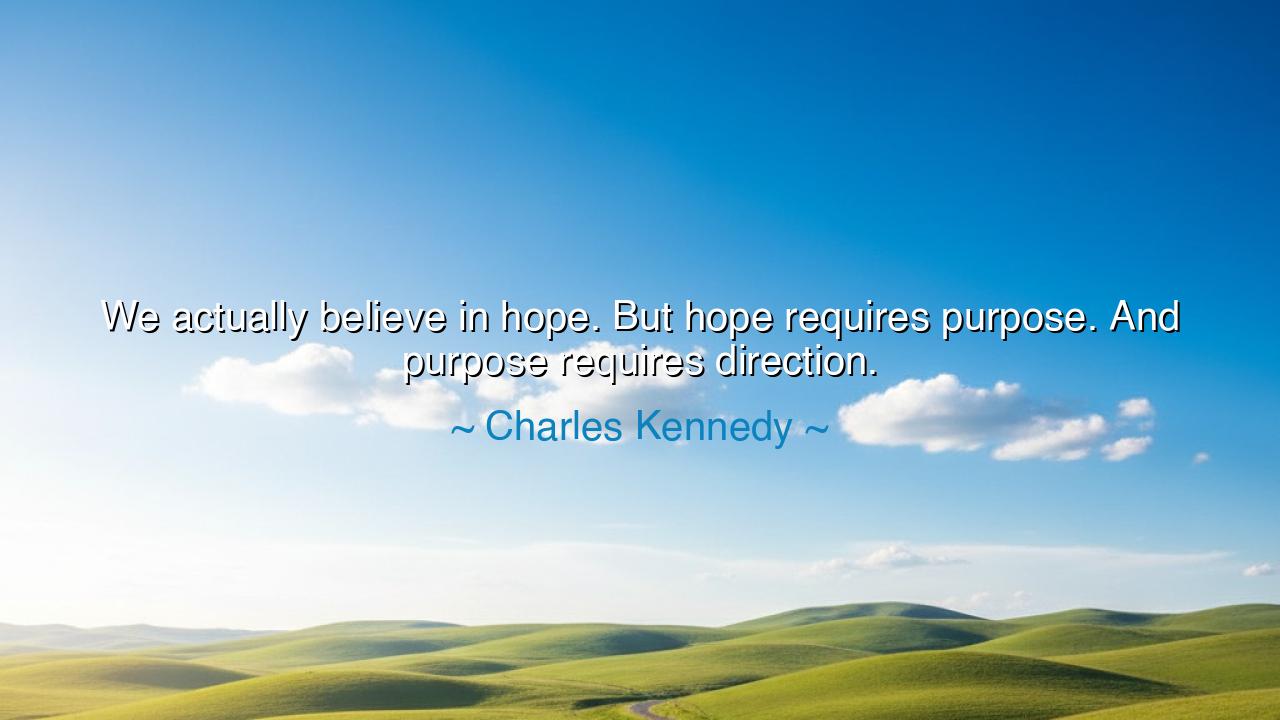
We actually believe in hope. But hope requires purpose. And
We actually believe in hope. But hope requires purpose. And purpose requires direction.






When Charles Kennedy declared, “We actually believe in hope. But hope requires purpose. And purpose requires direction,” he spoke with the voice of one who understood that hope is not a passive emotion, but a living force that demands action. His words rise above the realm of politics and speak to the heart of the human spirit itself. To Kennedy, hope was not the idle dreaming of those who wish for change; it was the steady resolve of those who build it. His statement forms a chain of truth—hope, purpose, and direction—each link dependent on the other, each essential to a life of meaning. Without direction, purpose wanders; without purpose, hope fades; without hope, the soul withers.
The origin of this quote lies in Kennedy’s work as a political leader and moral thinker, deeply devoted to public service and the betterment of society. As leader of the Liberal Democrats in Britain, Kennedy believed not only in ideals, but in the discipline required to pursue them. His words came from a recognition that hope, while beautiful, is fragile when untethered. He saw that in both nations and individuals, vision without structure leads only to disillusionment. Thus, he warned that true hope must be rooted in purpose—an aim that gives it strength—and purpose must, in turn, have direction, the clear path that transforms belief into progress. It is not enough to feel inspired; one must act with intention.
In his words we hear the echo of ancient wisdom. The philosophers of old, from Aristotle to Confucius, spoke of the alignment of thought, intent, and deed as the foundation of a meaningful life. Hope, they said, is the seed; purpose is the root; direction is the growth that reaches toward the light. When one element is missing, the soul falters. The hopeful man without purpose drifts like a ship without a rudder; the purposeful man without direction exhausts himself in circles. But when all three unite, the human spirit becomes unstoppable—a force capable of transforming despair into renewal, and dreams into destiny.
Consider the life of Florence Nightingale, who lived during a time when war and disease consumed countless lives. Many saw the suffering and turned away in despair. But Nightingale’s hope was not a vague wish for better days; it was a conviction shaped by purpose—to heal, to serve, to preserve life. And her purpose found direction in her tireless work, reforming hospitals and transforming nursing into a noble science. She did not wait for the world to become kind; she acted to make it so. Through her, we see the truth of Kennedy’s words—that hope alone is not enough. Only when guided by purpose and direction does hope become power.
Yet in the modern world, many have lost this triad of balance. We are surrounded by hope that lacks purpose—the kind that whispers of better days but fears to labor for them. We speak of change, but without direction, our energies scatter like leaves in the wind. Kennedy’s wisdom calls us back to clarity: to remember that hope must be anchored in intention. To believe is noble, but to build is divine. Every generation that has reshaped the world—whether through art, science, faith, or freedom—did so not by dreaming alone, but by marrying their dreams to purpose and marching forward with direction.
The lesson of Kennedy’s quote is both simple and profound. If you wish to live meaningfully, do not merely hope—decide what that hope is for. Give it purpose, and then chart the path that will make it real. Let your hope be like a star in the night sky, your purpose like the steady hand that holds the compass, and your direction the path that leads you ever forward. For the universe favors those who act in harmony with their vision, who refuse to let hope decay into passivity.
So, my children of the ever-turning world, take this teaching to heart: hope is the breath of the soul, but it must be given shape and motion. When despair whispers that you are powerless, answer with purpose. When confusion clouds your journey, steady your steps with direction. Be like the ancient mariners, who did not curse the storm but fixed their eyes upon the stars. For as Charles Kennedy taught, hope without purpose drifts, purpose without direction falters, but when all three unite, the impossible becomes possible. Let your life be a testament to that truth—and in so doing, become the very hope that others seek.






AAdministratorAdministrator
Welcome, honored guests. Please leave a comment, we will respond soon